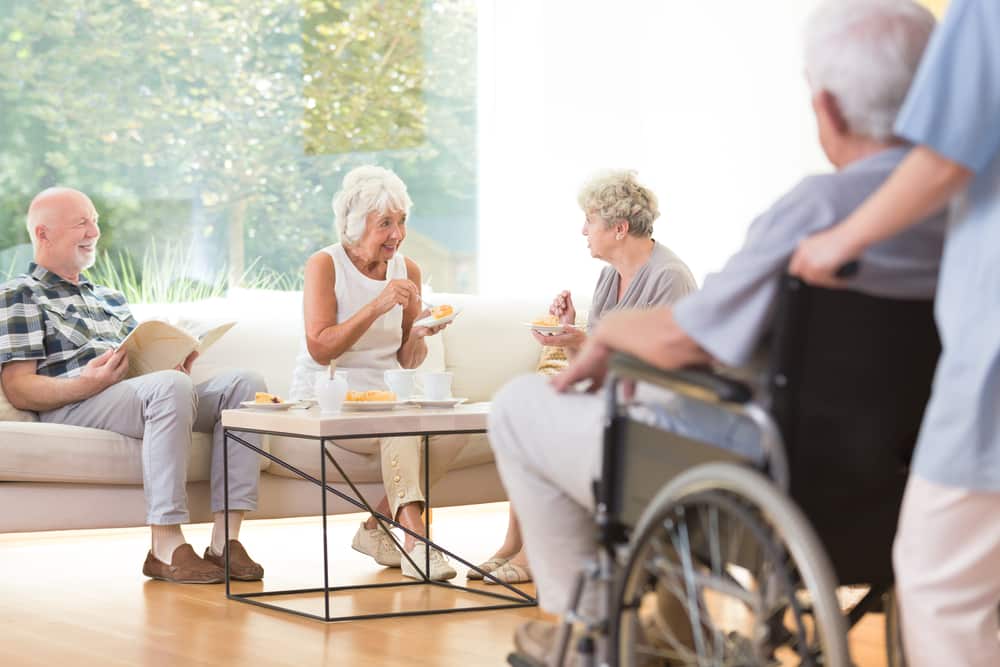Premier Charlotte Memory Care: Specialized Elder Care Solutions
Premier Charlotte Memory Care: Specialized Elder Care Solutions
Blog Article
Developing a Safe and Helpful Environment: In-Home Memory Treatment Fundamentals
Establishing a secure and caring environment for people needing in-home memory treatment is critical to their well-being and top quality of life. From making sure security within the living room to using efficient interaction methods and executing memory-friendly design elements, there are vital parts that add to an all natural care technique. By focusing on developing a helpful community that deals with the distinct demands of those with memory disabilities, caretakers can substantially boost the everyday experiences of their enjoyed ones.

Safe Living Setting
Producing a hazard-free and safe and secure living atmosphere is paramount when supplying in-home memory take care of individuals with cognitive disabilities. Making certain the safety of the private with amnesia is important to prevent mishaps and advertise a feeling of well-being. One necessary aspect of producing a secure living environment is to eliminate any kind of prospective threats that could cause slips, journeys, or falls. This includes protecting loosened carpets, ensuring sufficient lights in all locations of the home, and keeping pathways clear of clutter.
Additionally, it is necessary to mount safety functions such as grab bars in washrooms and handrails along staircases to supply assistance and protect against crashes. In addition, making use of modern technology such as activity sensing units and alarm systems can signal caretakers if the private wanders or is in distress. Producing a risk-free living environment also involves implementing strategies to stop wandering, such as making use of door alarm systems or locks to restrict access to dangerous locations. By focusing on precaution and eliminating potential threats, caretakers can supply a protected and supportive atmosphere for individuals with cognitive impairments obtaining in-home memory treatment.
Efficient Interaction Techniques
Implementing customized communication methods is important in cultivating meaningful communications with individuals with cognitive disabilities in the context of in-home memory care. Reliable communication plays a critical function in developing a supportive environment that improves the well-being and lifestyle for people with memory problems. When connecting with somebody experiencing cognitive decrease, it is necessary to make use of easy and clear language, maintain a calm and favorable tone, and give visual hints to aid understanding.
One trick technique is to practice energetic listening, revealing empathy, persistence, and regard throughout discussions. Non-verbal cues such as facial expressions and body movement can additionally aid convey understanding and support. Furthermore, making use of memory therapy by making use of or discussing past experiences music and art can tap into long-lasting memories, boosting and sparking connections engagement.
Furthermore, integrating routine routines and constant communication patterns can supply a feeling of experience and protection for people with memory problems. By applying these interaction approaches, caretakers can develop purposeful links and promote a sense of comfort and count on the in-home memory care setup.
Memory-Friendly Layout
Offered the relevance of producing a helpful atmosphere for individuals with memory problems with efficient communication strategies, the unification of memory-friendly layout aspects in the home becomes vital in enhancing their daily experiences and total health. Memory-friendly style concentrates on enhancing safety and security, comfort, and freedom for people with cognitive impairments. Easy modifications can make a significant difference, such as utilizing contrasting colors to improve presence and decrease confusion, including clear signs to aid navigating, and lessening additional info clutter to prevent sensory overload.
Including familiar components from the individual's past, such as favorite products or personal pictures, can stimulate positive memories and develop a sense of knowledge. Furthermore, ensuring appropriate lighting levels, mounting grab bars in restrooms, and applying non-slip flooring can aid prevent drops and injuries. Producing a comforting and calming atmosphere via using acquainted scents, soft structures, and calm noises can additionally advertise relaxation and minimize frustration. By integrating these memory-friendly style components, caretakers can offer a supportive and risk-free home that allows individuals go to website with memory problems to maintain their self-reliance and lifestyle.
Daily Routine Planning
When developing a daily routine for individuals with memory issues, careful planning is necessary to support their cognitive function and overall well-being. Establishing an organized timetable can aid lower anxiousness, disorientation, and complication often experienced by those with memory impairments. Begin by including acquainted activities that align with the person's choices and rate of interests. Uniformity in everyday routines can provide a feeling of safety and stability, aiding in the conservation of cognitive capabilities.
It is important to allow adequate time for each task, minimizing the requirement to rush and preventing possible irritation. Simple jobs like dish times, personal treatment, medication administration, and physical workout must be incorporated right into the routine. In addition, incorporating routine durations of rest and leisure can protect against exhaustion and frustration. Flexibility is essential, as some days might require modifications based upon the individual's mood and power degrees. Frequently reviewing and adapting the daily routine will certainly help ensure its efficiency in advertising a comforting and positive atmosphere for individuals with memory obstacles.
Support Group Execution
Establishing a robust network of supportive individuals plays a critical role in enhancing the quality of care and well-being for individuals calling for memory assistance. Relative, close friends, medical care specialists, and area sources can all add to producing a strong support group. Interaction amongst these people is important to make sure that the requirements of the private with memory challenges are met properly.
Relative are often the main caretakers and create the foundation of the support group. They give day-to-day treatment, psychological support, and friendship. It is crucial for household members to look for support and reprieve when needed to prevent fatigue and guarantee the very best possible care for their liked one.
In enhancement to family support, entailing healthcare specialists such as nurses, therapists, and medical professionals can supply customized care and assistance. These specialists can offer important understandings, clinical advice, and support in handling the person's problem.

Final Thought
To conclude, developing a supportive and safe atmosphere for individuals with memory care requirements is necessary for their health. By developing a secure living setting, making use of reliable interaction approaches, incorporating memory-friendly layout elements, planning daily routines, and executing Discover More a strong support system, caregivers can help improve the quality of life for those with memory loss. These vital elements collaborate to create a nurturing and empowering setting that advertises freedom and improves general high quality of life.
Producing a protected and hazard-free living environment is critical when providing in-home memory treatment for individuals with cognitive disabilities. By prioritizing safety and security actions and getting rid of prospective hazards, caretakers can give a supportive and safe and secure atmosphere for individuals with cognitive impairments obtaining in-home memory treatment.
Developing a robust network of supportive people plays a critical role in boosting the high quality of treatment and wellness for individuals calling for memory support - Charlotte Memory Care. Interaction among these people is necessary to guarantee that the needs of the private with memory challenges are fulfilled efficiently

Report this page